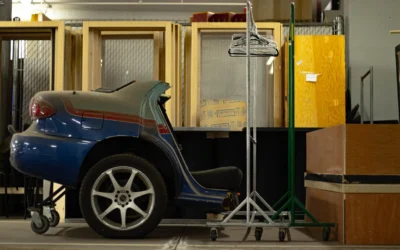Alberta has a worldwide reputation for its oil sands; it’s a hot-button issue in political conversation and a controversial representation of the province. While the media has examined the oil and gas industry through the eyes of celebrity activists Pamela Anderson, Jane Fonda, and various political pundits, we rarely examine the industry internally: the workers, their livelihoods, and well-being.
Omar Mouallem and Dylan Rhys-Howard’s documentary Digging in the Dirt lifts a curtain on the oil and gas industry, allowing us to see the emotional turmoil of Alberta’s workers as they struggle with identity, mental health, and toxic masculinity.
The film follows three subjects: Chris Johnson, an Edmonton crane operator with bipolar disorder who has worked in the oil patch since his teens; Dennis Shinkski, a recovering addict grieving his best friend’s suicide while training for a new career in social work; and Glenn Bielech, a Husky supervisor who lost both a close friend and a brother to suicide.
As the camera pans across familiar Alberta landscapes, the narrator calmly notes: “The price of oil includes the mental and emotional anguish common among Alberta’s oil and gas workers.”
The isolation of the industry paired with grueling hours and what subject Chris Johnson described as a “fit in or fuck off” attitude, makes for an extremely toxic workplace. The many downfalls of the work are sold to young men through promises of wealth and the ability to provide for their families.
Mouallem first came to understand the mental health crisis in the oil and gas industry through an assignment from a former editor. He went on to write an investigative news piece for Buzzfeed, entitled “Oil, Heartbreak, and Manhood: Behind The Mental Health Crisis of Alberta’s Oil Workers.” As a result, he won the 2017 Mindset Award for Workplace Mental Health Reporting.
“I started to see a bit of myself and my own obstacles in these guys that I didn’t think I’d be able to relate to; their problems and their poor coping mechanisms and the things that are at stake with them,” Mouallem explains.
Meanwhile, Howard created the 2017 short Peak Oil, a portrait of an unemployed pipe-fitter struggling to keep his marriage, and himself, together. Despite not having any personal connection to the oil and gas industry, Howard’s film encapsulated the turmoil of men across Alberta beautifully, using a familiar setting to express his own emotional struggle.
“(Peak Oil) was really cathartic for me, a way of excising a lot of the difficult feelings I was having at that point in my life,” he explains. “Making this film about a down-on-his-luck guy was a way for me to put all of these uncomfortable, and I guess traditionally masculine, feelings into one place and sort of deal with them.”
Howard won awards from Telefilm Canada, the National Screen Institute, and the Alberta Motion Picture Industries Association.
“He’s able to perceive what is going on in people’s lives and he saw enough of that in Alberta that he was able to construct a composite man in that situation,” Mouallem says of Howard.
As both men worked to tell the same story through different mediums, they eventually joined forces to create the one-hour documentary, Digging in the Dirt.
Mouallem and Howard’s use of their subjects’ stories, combined with the testimony of researchers and educators, forces the viewer to challenge the stereotypes of the oil and gas man.
Dennis Shinkski’s story is that of a man who turned to the party culture to cope with the overwhelmingly negative emotions he was experiencing. The adage “work hard, play hard” certainly applies to the men of the patch; using a self-destructive form of self-care to cope and to bond.
Mouallem notes the pervasive idea that the party lifestyle is a result of men having “more money than they know what to do with.”
“We’re not stopping to think that people don’t go on crack binges because they have too much money. There’s something inside, a problem there,” he adds.
Coping with mental health is not easy for men living completely isolated as a result of the industry. Stretches of work can last as long as three weeks, and limited access to care makes seeking healthy options nearly impossible.
“How do you take care of yourself in that situation? You don’t. You just find the little pleasures,” explains Mouallem.
“Why do they think that this party lifestyle is going to make them happier, make their problems go away, give them the emotional or spiritual nourishment that they need? The reason they think that is because of the way we raise men to cope with life,” Mouallem continues.
Glenn Bielech shares in the film that he was taught to handle his mental health externally — to get a new girlfriend or sort out his finances, for example. While the external factors in our lives naturally affect our mental states, there is a trend in the way men approach their anguish, or rather in the way they avoid their anguish.
Mouallem related to Bielech’s instincts to focus on the external rather than the internal: “When you have a crisis you should see a therapist that day. They have emergency centers for that. I didn’t know that … the first thing I did was contact my closest male friends and seek advice for how I should deal with this. And the advice I got wasn’t great, a lot of it backfired. That is not a judgment on them, it’s a judgment on the way we as men are taught to handle our mental health, it’s part of our male malaise.”
The realities of toxic masculinity are exaggerated in male-dominated spaces. Generations of Albertan men have worked in the patch, and young men are expected to handle the rigor of the industry just as their fathers did. These men inherit the best and the worst of their fathers. The best is self-discipline, having pride in providing for your family, and pride in the work you do. The worst is a lack of identity beyond the workplace, a “boys don’t cry” attitude, and an inability to cope with one’s emotions.
When your identity is stripped of you, when you lose your job, are laid off, or are in such a mental health crisis that you can’t perform anymore, you feel degraded as a man and therefore degraded as a human being.
“If your father was particularly susceptible to the toxic, macho culture there and brought that home, why wouldn’t you absorb that?” asks Mouallem.
Both the subjects of the film and the filmmakers’ personal experiences are proof that men, both in and outside of the industry, are not socialized to handle their mental or emotional anguish in healthy ways. When this is paired with a toxic environment that aggravates mental health issues, it is only natural that higher rates of mental crisis, substance abuse, and suicide would occur.
The film is also evidence, however, of a shift in harmful workplace culture.
“We don’t culturally do very well with asking for help … so when it comes to mental health outreach it’s most effective when it’s peer-to-peer,” explains Howard. “We can have a culture where people can identify symptoms of psychological distress the same way we identify when somebody is physically ill and shouldn’t come to work.”
Mouallem agrees that peer-to-peer intervention is key: “It has to be presented to them not at the corporate level, not even at the union level, but it’s best presented peer-to-peer, as Dan says in the film, as a form of skills acquisition.”
Lorna Thomas lost her son, Alex Thomas-Haug, to suicide in May of 2012. Answering the promise of making big money in Alberta’s oil and gas industry, Alex trained as a welder. He worked long hours, sometimes more than 60 hours a week. He became isolated and depressed, eventually turning to cocaine as a coping mechanism.
Alex struggled to speak about his experiences. Thomas is now involved in the Tough Enough To Talk About It program through NAIT, which she discovered shortly after her son’s death. Thomas and her husband offer their lived experience to the program: the realities and consequences of the job.
“When he got his first placement, he immediately had some medical issues because of the demands of the job. Alex didn’t want his mom going to the workplace, the school didn’t have any say, his high school didn’t have any access to his workplace. So, it’s kind of like suddenly this young person is set adrift with no protections, no voice, no unions,” she explains.
“He was 16 when he first started. He was isolated from his peers and his girlfriend. He wanted to finish the path he had started, not necessarily for the rest of his life, but he was down that path. He was enamored with the workplace but had no way to anticipate what the costs would be,” Thomas continues.
Lorna has dedicated her work to look at the impact of suicide and substance use on men in the trades, via Moms Stop the Harm.
Digging in the Dirt has created a much-needed dialogue in our province, revealing those who have suffered in the oil and gas industry, as well as those who have dedicated their lives to creating a much needed positive change in Alberta’s culture. The response to the film itself is proof that men’s mental health in the oil and gas industry is a narrative the resonates throughout Alberta.
“I want to contribute to a culture where men can discuss their feelings and can hopefully use something other than anger to process what is going on with them,” explains Howard. “The more representations we have of men being forthcoming, tough men like we have in our film, the more we can see that vulnerability, the more we can work on internalizing that it’s okay.”
If you need help there is a 24-hour distress line available 7 days a week.
780-482-4357 (HELP)





0 Comments